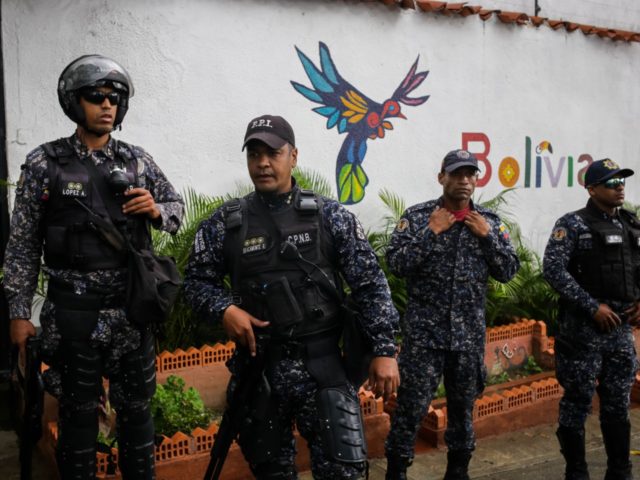An unnamed 11-year-old Venezuelan boy in the state of Anzoátegui accused police of extreme torture, including a severe beating and electrocution, for playing with the statues in a public Christmas manger in a video shared widely online this week.
The boy recalls that he and an eight-year-old friend came across a government manger – dictator Nicolás Maduro decreed two months of mandatory Christmas “happiness” at the beginning of November – and were interested by it, so they started playing with the sheep displayed inside. Members of the Bolivarian National Guard (GNB), the repressive state security apparatus usually unleashed on pro-democracy protesters, found the children and proceeded to violently assault them/
The video first surfaced online on Sunday, published by Delsa Solorzano, head of the opposition Citizen Encounter political party.
The video appears to be filmed by the boy’s guardian, who does not identify him but also does not hide the boy’s face. The boy also exhibits a bloody wound on his ear from the assault.
El mundo debe saber de lo q son capaces los sátrapas vzlanos. Esto ocurrió en el Edo Anzoátegui. Este pequeño niño denuncia q fue brutalmente torturado por el Ttte GNB Arellano. Vamos a llevar este caso hasta las últimas consecuencias. Ya hemos hecho contacto con la familia . pic.twitter.com/6SISeZpyyO
— Delsa Solorzano (@delsasolorzano) November 17, 2019
“Lieutenant Arellano stuck my head in a bucket of water with my hands at my back, he electrocuted me, he grabbed my head and smacked me so hard I fell to the floor,” the boy says. “They grabbed me by the ears and started to beat my head against the wall and threatened me that, if I told my parents, they were going to become the monsters of my nightmares.”
Venezuelan media reported that an audio file is also circulating, though unconfirmed, of the testimony of the younger boy. According to a report from the Argentine outlet Infobae, the boy reportedly says, “they smacked us repeatedly and tossed us on the floor, and they electrocuted Ricardo and drowned us and asked if we felt death.”
There are at press time no reports of arrests, or even an open investigation, on the incident, though locals who know the children have demanded a probe into the incident and justice for the children.
Torture is a common practice under Maduro’s socialist regime. The CASLA Institute, a non-governmental human rights organization, published a report in 2018 highlighting dozens of cases of documented use of torture, most against members of the military that refused to carry out orders from Maduro. Maduro regularly uses the military to repress peaceful pro-democracy protesters, torture political prisoners, and otherwise maintain the dictator’s unpopular rule.
“When we describe Venezuela as an open-air concentration camp, where those who live there are subject to all sorts of arbitrary abuse, systematic repression, and state terrorism, that is not just a slogan,” CASLA executive director Tamara Suju said at the Organization of American States (OAS) at the time.
Electroshock is a particularly common form of torture among Venezuelan prison guards. In one of the documented cases Suju described, a political prisoner was shocked under his arms so hard that his toenail’s exploded off.
Given attempts by the Maduro regime to hide the extent of the use of torture, it is impossible to have a full tally of the number killed in this manner. In July, police were unable to hide the high profile case of Navy Corvette Captain Rafael Acosta Arévalo. Arévalo was charged with “terrorism” and “sedition” and arrested in full health. When he later appeared for his first court hearing, he could not walk or speak, saying only “help” from his wheelchair. He exhibited obvious signs of torture. Arévalo died the next day.
Lorent Saleh, a survivor of El Helicoide, Caracas’ major political prison, said following his release in 2018 that he saw guard crucify political prisoners, beat them, and turn them on each other – torturing them into offering to beat other prisoners in exchange for relief. Those who turned on the other prisoners typically received even greater punishment, Saleh said, “because nobody, not even the guards, trusted them.”
While Bolivarian National Guard troops have typically not flooded their prisons with minors, they have killed them in the front lines of protests. Nearly 1,500 children died as a result of violence in 2018, most at the hands of police in cases branded “resistance to authority,” and many while participating in protests. The number signified a “meaningful” increase in such deaths from 2017, according to human rights researchers.
Like all Venezuelans, children have lost most of their sense of normalcy under socialism. Nearly 80 percent of children no longer attend school in the country, according to a report published in July. Most do not do so because the country has no teaching staff and most Venezuelans cannot afford to feed their children three meals a day. The same survey found that 67 percent of teachers regularly miss classes because of the complete breakdown of public transportation.
“Venezuela today has one of the best education systems in Latin America and the world, let us be proud!” Maduro boasted in September when classes were supposed to restart. “Venezuela is the only country in the world that gives boys and girls their backpack with supplies … their uniforms, that guarantees public education to 80 percent of people, free and of high quality!”
Maduro proposed fixing the broken school system in October by installing chicken coops in classrooms.
Maduro’s illegitimate regime will receive a seat on the United Nations Human Rights Council in 2020.

COMMENTS
Please let us know if you're having issues with commenting.